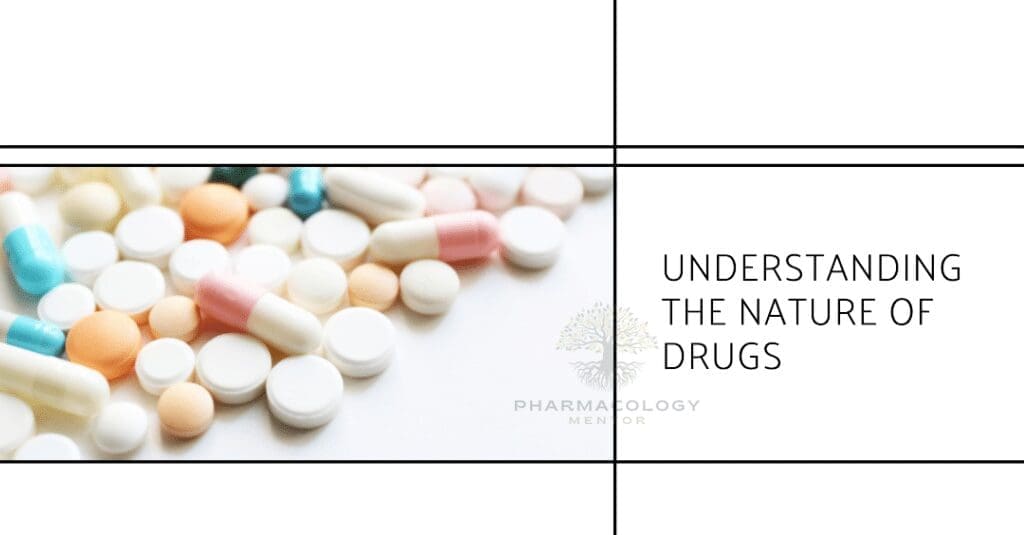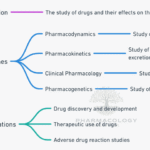The nature of drugs encompasses what drugs are, how they are named and sourced, how their physicochemical features determine interactions with biological targets and movement through the body, and how these principles unify pharmacodynamics and pharmacokinetics for rational therapeutics. Standard texts emphasize that drug action is defined by molecular targets and the laws of binding and response, while drug disposition is governed by membrane transport, protein binding, distribution volumes, metabolism, and clearance.
What is a “drug”
A drug is a chemical agent that interacts with a molecular target in a living organism to produce a biological effect that can be therapeutic or toxic depending on dose and context. Most drugs achieve effects by binding to proteins such as receptors, enzymes, transporters, or ion channels, though some act on nucleic acids or by physicochemical means.
Drug naming and nomenclature
Each drug typically has a chemical name, a nonproprietary (generic, often the WHO International Nonproprietary Name), and one or more proprietary brand names used in commerce. Texts also distinguish pharmaceutical equivalence and bioequivalence, the latter defined when rate and extent of bioavailability are not significantly different under appropriate test conditions for products with the same active ingredient.
Sources and types of drugs
Drugs arise from natural sources (plants, microbes, animals), semisynthesis, total chemical synthesis, and biotechnology (recombinant proteins, monoclonal antibodies, nucleic acid therapeutics). Small molecules usually engage pockets on proteins through reversible noncovalent forces, while biologics engage extracellular targets with high specificity but distinct disposition (parenteral delivery, catabolic clearance).
Physicochemical features that matter
Size, shape, chirality, lipophilicity, and ionization state (pKa) determine a drug’s ability to cross membranes, bind targets, and be formulated in useful dosage forms. Most drugs are weak acids or bases present as an equilibrium of nonionized and ionized forms, and transmembrane distribution reflects the Henderson–Hasselbalch relation and pH gradients (ion trapping).
Drug–target interactions
Drug binding strength (affinity) and ability to produce response upon binding (efficacy) are distinct, with agonists having both affinity and efficacy, and antagonists having affinity without efficacy. Interactions are mediated by hydrogen bonding, ionic bonds, hydrophobic interactions, van der Waals forces, and occasionally covalent bonds (e.g., irreversible inhibitors), which together determine selectivity and residence time.
Major drug targets
- Receptors: GPCRs, nuclear receptors, enzyme-linked receptors, and ion channel receptors translate ligand binding into signals and are major drug classes.
- Ion channels and transporters: voltage- and ligand-gated channels and solute carriers/ABC transporters alter excitability and solute flux relevant to many therapies.
- Enzymes and structural proteins: catalytic sites and scaffolds can be inhibited, activated, or hijacked by drugs to alter pathways.
Receptor theory essentials
Graded dose–response relates effect to drug concentration via a rectangular hyperbola, often summarized as the Emax model: E=Emax⋅CEC50+CE=EC50+CEmax⋅C, where EC50EC50 is the concentration producing half-maximal effect. Agonist potency reflects EC50EC50 and efficacy reflects EmaxEmax, while competitive antagonists shift agonist curves rightward without lowering EmaxEmax, and noncompetitive/irreversible antagonists depress EmaxEmax with limited shift in EC50EC50.
Agonism beyond “on/off”
Partial agonists have lower efficacy than full agonists and can antagonize full agonists at shared receptors, while inverse agonists reduce constitutive activity in receptors with basal signaling. Allosteric modulators bind at topographically distinct sites to change orthosteric ligand affinity/efficacy positively or negatively, often improving selectivity and ceiling effects.
Spare receptors and coupling
When a maximal response occurs without full receptor occupancy, the system has “spare receptors,” reflecting downstream amplification and efficient coupling, which affects apparent sensitivity to antagonists. Repeated stimulation can produce desensitization and downregulation, while blockade can cause upregulation, both altering responses over time and influencing withdrawal phenomena.
Graded vs quantal responses
Graded responses measure continuous effect in an individual, whereas quantal responses categorize an all‑or‑none outcome across a population to derive ED50 (effective), TD50 (toxic), and LD50 (lethal) and to visualize therapeutic window. Therapeutic index and margins of safety are useful but context‑dependent; clinicians prioritize therapeutic windows validated by clinical outcomes over simple TI ratios.
Pharmacokinetics vs pharmacodynamics
Pharmacodynamics relates concentration to effect at the target, while pharmacokinetics describes drug exposure via absorption, distribution, metabolism, and excretion (ADME). The concentration–time profile at the effect site links PK to PD, and clinical pharmacokinetics uses measurable plasma concentrations as surrogates to design dosing achieving steady-state goals.
Membrane transport and absorption
Passive diffusion depends on the concentration gradient, membrane area, and lipid–water partition, favoring nonionized lipophilic species, especially across high‑area small intestine epithelium. Carrier-mediated transport, paracellular flux in leaky capillaries, and endocytosis contribute in specific tissues, while barriers with tight junctions (e.g., blood–brain barrier) limit paracellular movement and favor lipophilic neutral species or use of specific transporters.
Distribution: perfusion and binding
Drug distribution initially favors highly perfused organs and later equilibrates with larger, less perfused tissues, often governed by tissue partitioning and plasma/tissue protein binding. Only unbound drug crosses membranes and interacts with targets, so plasma protein binding constrains distribution and filtration but does not change unbound steady-state concentrations at a constant clearance.
Core PK parameters and equations
Clearance (CL) defines body efficiency in eliminating unbound drug, volume of distribution (Vd) reflects the apparent space the drug distributes into, and half‑life relates both via t1/2=0.693⋅VdCLt1/2=CL0.693⋅Vd. At steady state with complete bioavailability, Dosing rate=CL⋅CssDosing rate=CL⋅Css, guiding maintenance regimens to achieve desired target concentrations.
Bioavailability and bioequivalence
Bioavailability (F) is the fraction of dose reaching systemic circulation intact, influenced by dissolution, permeability, first‑pass metabolism, and route of administration. Pharmaceutical equivalents are bioequivalent when their rates and extents of availability are not significantly different, a regulatory construct enabling generic substitution when products contain the same active ingredient and dosage form.
Routes and barriers
Choice of route alters first‑pass exposure and onset: IV ensures complete bioavailability, sublingual avoids hepatic first‑pass, and transdermal requires lipid diffusion through stratum corneum. The BBB and placental barrier restrict entry by tight junctions, favoring lipophilic nonionized unbound drug with pH gradients creating ion trapping (e.g., basic drugs accumulating on acidic side).
Stereochemistry and specificity
Chirality can influence affinity and efficacy at targets, disposition by stereoselective metabolism or transport, and safety, so enantiomerically pure drugs may show improved selectivity or fewer adverse effects compared with racemates. “Selectivity” means preference among targets within a concentration range, whereas “specificity” is rare in biology and most drugs exhibit off‑target actions at higher exposures.
Prodrugs, metabolites, and “soft” drugs
Prodrugs exploit metabolic conversion to active species to improve absorption or targeting, while “soft” drugs are designed for predictable rapid inactivation after exerting local effect. Active metabolites can contribute substantially to overall effect and half‑life, complicating interpretation of exposure–response and drug interactions.
Variability: genes, age, disease, interactions
Pharmacogenetic variation in enzymes and transporters, developmental changes in renal/hepatic function, and disease states alter exposure and response, requiring dose individualization. Drug–drug interactions can be pharmacokinetic (e.g., clearance modulation) or pharmacodynamic (e.g., additive toxicity), and both must be considered alongside narrow therapeutic windows.
Safety language: on‑ vs off‑target
On‑target toxicity arises from exaggerated pharmacology at intended targets (often exposure‑related), whereas off‑target effects reflect interactions with unintended proteins or pathways. Quantal population data (e.g., TD50) and real‑world pharmacovigilance shape therapeutic windows and monitoring strategies for safe use.
Table: principal target classes and examples
Table: key dose–response concepts
Putting principles to work
Rational therapy chooses the right drug (target, selectivity), the right formulation/route (bioavailability, first‑pass), and the right regimen (loading dose by VdVd, maintenance by CLCL) to place and keep concentrations in the therapeutic window. Understanding partial agonism, allosteric modulation, and system coupling helps anticipate when two drugs at the same receptor can produce different clinical outcomes despite similar nominal binding.
High‑yield formulas
- Emax model: E=Emax⋅CEC50+CE=EC50+CEmax⋅C for graded responses.
- Half‑life: t1/2=0.693⋅VdCLt1/2=CL0.693⋅Vd, linking persistence to distribution and clearance.
- Maintenance dosing (IV steady state): Dosing rate=CL⋅CssDosing rate=CL⋅Css.
Bioequivalence and generics in context
When two pharmaceutical equivalents are bioequivalent, they are expected to yield comparable clinical effects and safety when administered under labeled conditions, enabling substitution by generics. Nonetheless, formulation differences can affect absorption rate and tolerability, making clinical judgment and patient feedback integral to safe interchange.
Barriers and special compartments
Blood–brain barrier and blood–CSF barrier rely on tight junctions and transporter expression, making lipophilicity and unbound fraction critical for CNS penetration. Placental transfer exposes the fetus to many maternal drugs with pH differences causing ion trapping of basic drugs, emphasizing caution in pregnancy.
Summary perspective
The nature of drugs is the interplay of chemistry with biology: physicochemical properties determine access, targets determine effect, and human variability determines outcome, all quantifiable by the linked languages of pharmacodynamics and pharmacokinetics. These foundations from core textbooks enable prediction, measurement, and control of therapy to maximize benefit and minimize harm.
References (Vancouver style)
- Ritter JM, Flower R, Henderson G, Loke YK, MacEwan D, Robinson E, Fullerton J. Rang & Dale’s Pharmacology. 10th ed. London: Elsevier; 2024. General principles of drug action and receptors.
- Brunton LL, Parker KL, Blumenthal DK, Buxton ILO. Goodman & Gilman’s Manual of Pharmacology and Therapeutics. New York: McGraw‑Hill; 2008. Section I: General Principles (PK/PD, bioavailability, bioequivalence).
- Katzung BG, Masters SB, Trevor AJ. Basic & Clinical Pharmacology. Section I: Basic Principles; Drug Receptors & Pharmacodynamics. New York: McGraw‑Hill; various eds.
- Alexander SPH, et al. The Concise Guide to PHARMACOLOGY: Overview and target families. Br J Pharmacol. 2015–2021 editions.
📚 AI Pharma Quiz Generator
🎉 Quiz Results
Medical Disclaimer
The medical information on this post is for general educational purposes only and is provided by Pharmacology Mentor. While we strive to keep content current and accurate, Pharmacology Mentor makes no representations or warranties, express or implied, regarding the completeness, accuracy, reliability, suitability, or availability of the post, the website, or any information, products, services, or related graphics for any purpose. This content is not a substitute for professional medical advice, diagnosis, or treatment; always seek the advice of your physician or other qualified health provider with any questions you may have regarding a medical condition and never disregard or delay seeking professional advice because of something you have read here. Reliance on any information provided is solely at your own risk.



